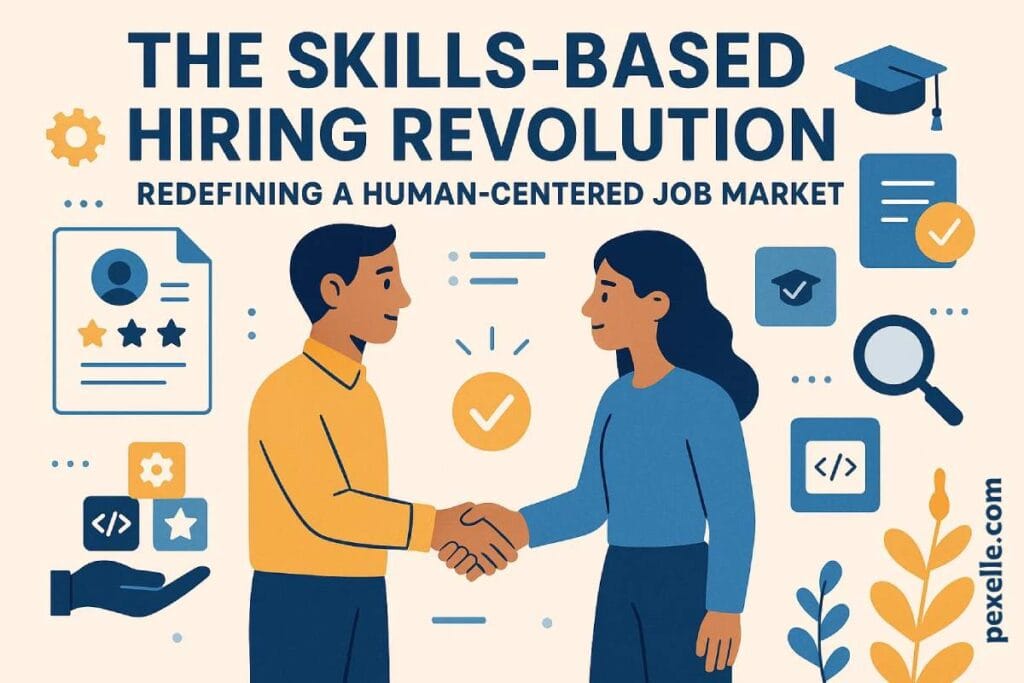The Skills-Based Hiring Revolution: Redefining a Human Centered Job Market

Introduction: From Degrees to Deliverables
The traditional job market has long been centered around academic degrees, job titles, and years of experience. While these metrics once served as reliable indicators of competence, the rapid pace of technological advancement and shifting industry demands have exposed their limitations. A growing number of organizations are embracing skills based hiring, prioritizing what candidates can do over where they went to school. This paradigm shift is not merely a hiring trend—it is a revolution redefining the future of work.
Why Skills-Based Hiring Matters
Skills-based hiring centers the job market around individual capabilities, breaking down systemic barriers that often exclude competent talent. For instance, many people possess highly valuable skills acquired through non-traditional paths—such as bootcamps, freelancing, online certifications, or lived experience—but are overlooked due to lacking formal credentials.
Here are the key benefits of this model:
- 🌍 Inclusivity: By removing rigid credential requirements, underrepresented groups gain fairer access to job opportunities.
- 💼 Agility: Companies can quickly adapt to changing needs by hiring for current and emerging skill sets.
- 🔍 Accuracy: Skill assessments offer a more precise understanding of a candidate’s real-world performance.
- 🧠 Lifelong Learning: Encourages continuous upskilling and reskilling aligned with evolving industry trends.
Impact on Job Seekers and Employers
For job seekers, especially those without degrees or with non-linear career paths, this is a game changer. Platforms like LinkedIn and Coursera now enable individuals to showcase micro-credentials, skills badges, and portfolio work, demonstrating value beyond a résumé.
For employers, it improves ROI by:
- Reducing time-to-hire with practical assessments
- Lowering employee turnover, as candidates are better matched to roles
- Expanding talent pools, especially in competitive sectors like tech and healthcare
A McKinsey study found that organizations that hire based on skills see a 12% increase in productivity and better long-term retention.
Redefining Talent Pipelines and Job Platforms
To support the skills-based ecosystem, entire infrastructures are evolving. AI-driven platforms can now match candidates to jobs based on skill taxonomies (e.g., ESCO, O*NET), real-time labor market data, and competency-based evaluations.
Governments, too, are investing in national skills registries and digital credentials to standardize and validate alternative learning paths. In Africa and Asia, for instance, youth employability initiatives are focusing heavily on skills passports and microlearning platforms.
Recruitment is no longer about “filling roles” but about empowering people to contribute meaningfully, regardless of background.
Challenges and Considerations
Despite its promise, skills-based hiring is not without challenges:
- ❗ Lack of standardization in skill verification
- 🛠 Difficulty designing unbiased, scalable skill assessments
- 🧭 Resistance from traditional HR frameworks
To truly mainstream this model, collaboration is needed across education providers, employers, policymakers, and tech platforms.
Conclusion: Humanizing the Labor Market
Skills-based hiring is more than an HR strategy—it’s a human-centered redesign of the job market. By shifting focus from credentials to capabilities, it honors diverse experiences, fosters equity, and unlocks untapped potential in every corner of the workforce.
As we face automation, remote work, and global talent shifts, the question for employers is no longer “Where did you work?” but “What can you do?”
🔗 Let skills not status define the future of work.
Source : Medium.com




